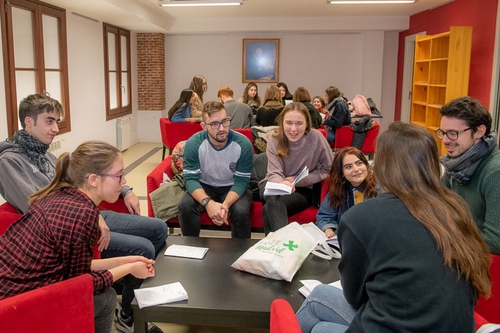Commented Bible Passages
March
Therefore, remember that formerly you who are Gentiles by birth and called “uncircumcised” by those who call themselves “the circumcision” (which is done in the body by human hands)—remember that at that time you were separate from Christ, excluded from citizenship in Israel and foreigners to the covenants of the promise, without hope and without God in the world. But now in Christ Jesus you who once were far away have been brought near by the blood of Christ. For he himself is our peace, who has made the two groups one and has destroyed the barrier, the dividing wall of hostility, by setting aside in his flesh the law with its commands and regulations. His purpose was to create in himself one new humanity out of the two, thus making peace, and in one body to reconcile both of them to God through the cross, by which he put to death their hostility. He came and preached peace to you who were far away and peace to those who were near. For through him we both have access to the Father by one Spirit. Consequently, you are no longer foreigners and strangers, but fellow citizens with God’s people and also members of his household, built on the foundation of the apostles and prophets, with Christ Jesus himself as the chief cornerstone. In him the whole building is joined together and rises to become a holy temple in the Lord. And in him you too are being built together to become a dwelling in which God lives by his Spirit. (Ephesians 2:11-22 NIV)
The author of the Letter to the Ephesians wants to describe the brand-new relationship we have with one another since the death and resurrection of Jesus. He does this by using many terms taken from the political life of Greek society—strangers, residents, fellow citizens, free access, foundation. These technical terms, which seem to come from a ministerial decree regulating the granting of visas, take on a particularly original coloring when they are used to describe the link between believers and Christ and the link between different believers. The use of a political vocabulary is certainly not an accident. The author wants to speak about a new way of being in the world, a new belonging, a “citizenship” which is even more fundamental than that of our passport.
This radical change of identity was born at the foot of the cross, where “he put hostility to death.” What kept us far from God, our transgressions, is put behind the cross. God stands between us and our own violence. Accepting to die out of love and entering into the life of eternity, Jesus eliminates the final barrier, the one between us and God.
The vulnerability of the Son is likewise able to “put hostility to death” by eliminating the distance between peoples, in particular between the chosen people and all the others. By the gift of Jesus’ life, we all become members of one another. The cross plays the role played by a constitution in a state: it provides the glue necessary for a common identity.
The new body can then be built. We are “fellow citizens with God’s people.” From now on, what defines us is that we receive something of God’s splendor, of God’s power, of God’s absoluteness, because we have free access to him. In political life, only the powerful have access to those who hold power. Power attracts power. In this new citizenship, we have access to “power” by the event which expresses in the most extreme fashion God’s poverty and simplicity: the cross.
It is then evident that there is no more geographical distance: “peace to you who were far away and peace to those who were near.” In this new state, with no borders, everything “is jointed together and rises” to bring about reconciliation.
![]() Given the identities based on conflict in our societies, what can we do to show that another kind of “citizenship” is possible?
Given the identities based on conflict in our societies, what can we do to show that another kind of “citizenship” is possible?
![]() “Putting hostility to death”: how do I understand that expression? What does it inspire in me concerning my relationship with others?
“Putting hostility to death”: how do I understand that expression? What does it inspire in me concerning my relationship with others?
 TAIZÉ
TAIZÉ